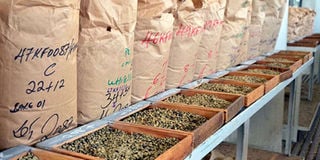Go blue, but it will be a blunder to lose sight of the precious brown

Coffee beans being auctioned at the Nairobi Coffee Exchange on October 2, 2018. Protect agriculture to stimulate the rise of an agro-industrial society. PHOTO | FILE | NATION MEDIA GROUP
What you need to know:
- For our country to organically industrialise, it must pay heed to the indispensable sector that is agriculture.
- A robust agricultural regime will trigger innovation for efficiency, mechanisation, new products, and new markets across the value chain.
This week, everyone was seeing and singing blue. Nairobi was a flood of neo-blue economists. Dizzying data and attendant analysis charmed every soul that apparently appeared to have discovered, belatedly though, that water is life and wealth.
The just-concluded Blue Economy Conference, of course was a masterstroke stimulating conversations that trigger insights and foresights on how to optimally exploit and manage an otherwise lucrative trove. But then, let the dazzle of blue not blind us from the land.
The brown economy, driven by soil, is still golden, more so agriculture, which should be the precursor to the rise of an industrial Kenya. It should be revisited and revitalised with zest.
Yet, as it is, there is a monster on the loose devouring our agriculture sector and with it lives and future.
AGRICULTURE
See, Kenya is desirous of rising as a mid level-manufacturing hub. Fantastic dream. A robust manufacturing milieu spawns auxiliary benefits especially in research and innovation, social and welfare portfolios.
Such a realm, mostly, hauls folks from subsistence and poverty to dignity and wealth.
But then, we are not going to achieve much in manufacturing amid a shambolic agriculture sector that is right in the jaws of a demon.
We need to bottle the genie. In other words, for our country to organically industrialise, it must pay heed to the indispensable sector that is agriculture.
Today, agriculture contributes about 26 percent of GDP. It is perhaps the largest employer - directly or indirectly - with roughly 70 percent of Kenyans reliant on it.
Yet, everyday we are unwittingly chocking it to death.
IMPORTS
I once attended a conference where the now embattled Agriculture Principal Secretary Richard Lesiyampe dropped depressing stats. The PS revealed thus: “We import 60 percent of rice consumed in this country. We import 65 percent of sugar and 70 percent of wheat…” That is not enough.
Throw in the maize saga, poor post-harvest handling and storage, fake seeds and fertiliser and you get a post-card of how raw greed, mediocre and leadership is driving agriculture to its knees and with it the manufacturing sector.
Sadly, by the latest sugar debacle, parliament, it seems, has miserably failed to tame the executive.
Everyone seems to have gone rogue, throwing caution to wind in the most immoral manner as floodgates of imports open.
Farmers are further deliberately sabotaged through lack of extension experts, low and delayed commodity price and even starving research funds.
COFFEE
Good people, this is a tragedy. It is a shame. It is criminal. It is such criminality that is smashing coffee — Kenya’s crop jewel.
Apart from frustrating farmers, the cartels have made sure little processing can be done locally. We only roast five percent of the production.
Yet, our Arabica coffee is finest in the world, sought after for blending.
You need to know the prestige of our coffee when international coffee chains like Starbucks proudly display posters boasting their beans are from Kenya.
Thus, Kenya needs to emulate Ghana and Ivory Coast, which are building local infrastructure to process Cocoa.
DEPENDENCY
In fact, The Economist of November 17, revealed that African Development Bank is loaning Ghana about $600 million for cocoa processing.
We need such in Kenya cutting across the divide. Indeed, it should not be lost on us that, in Kenya, agriculture is like a low hanging fruit.
It easily predisposes itself to manufacturing and technological innovation. As a people, we are agrarian, and our economy is entwined with the sector.
Agriculture has a long history and therefore a long, intricate value-chain ranging from seed production, agrochemicals, and engineering of farm implements to processing — both micro and macro.
Further, agriculture easily ropes such services as banking, insurance, research, innovation and Information Technology.
ECONOMY
That is why it defeats logic when reality dawns on us that the agriculture sector, epically merchandised as the backbone of the economy, is being, unwittingly, dismantled by a cabal of parochial, unpatriotic, technocrats and greedy cartels.
That is why the sector needs to be re-engineered. This way, we can recalibrate, nurture, expand and strongly protect agriculture to stimulate the rise of an agro-industrial society.
A robust agricultural regime will trigger innovation for efficiency, mechanisation, new products, and new markets across the value chain.
But, if our appetite for imports is left as wild as it is, we are just transferring such benefits to the countries of origin.
If we cannot chop off the runaway mediocrity from our boardrooms we shall always, as a nation, remain miserable consumers of imports killing our dreams.
MANAGEMENT
The twain of agriculture and manufacturing are inseparable. And thus, to spur the sector, we need the grit to crash the deeply entrenched cartel empire.
Solid budgetary allocation to agriculture should be indispensable. The executive must also cherry-pick the savviest turnaround technocrats to resuscitate the sector.
More funding should be channelled towards research and innovation that will also spur cottage-processing units.
Co-operatives too should be strengthened to give them leverage in the market and in processing. Lest we forget, the only way to the golden age of manufacturing is through a golden age of agriculture production.
Mr Wamanji is a Public Relations and Communication adviser ([email protected]; @manjis)





